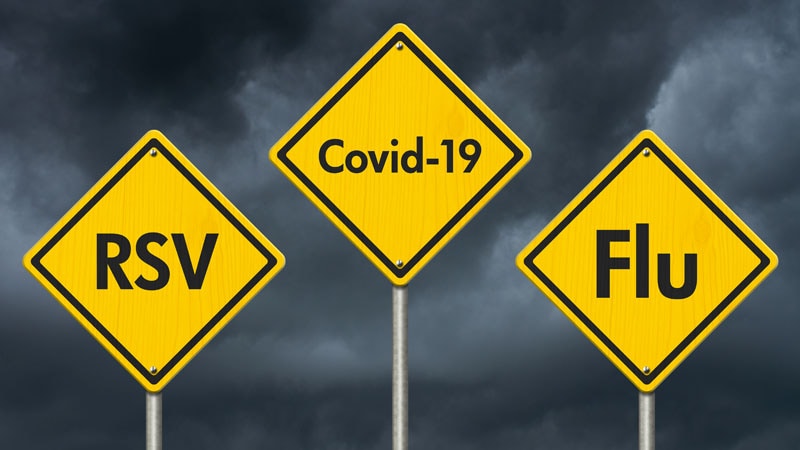On September 19, Medscape hosted a live virtual event around this year’s “tripledemic” of COVID-19, influenza, and respiratory syncytial virus (RSV). The CDC’s Manisha Patel, MD, MS, MBA, spoke with Dr Eric Topol, Medscape’s Editor-in-Chief, during the event, during which audience members asked questions of our panelists.
Below, Dr Patel addresses several of the questions from the audience with important implications for patient care. You can listen to the full recording of the event here.
Q: Can a patient who had Guillain-Barré syndrome (GBS) many years ago after receiving the influenza vaccine take the current vaccine for RSV?

Dr Manisha Patel
Dr Patel: A history of GBS following prior vaccines is not a contraindication nor a precaution to RSV vaccines. Serious neurologic events, including GBS and other inflammatory neurologic events, were reported after RSV vaccination in clinical trials. Whether these events occurred due to chance or whether RSV vaccination increases the risk for inflammatory neurologic events is currently unknown. Using shared clinical decision-making, RSV vaccination in older adults should be directed to those who are at increased risk for severe RSV disease and therefore most likely to benefit from vaccination.
As for all FDA-approved vaccines, CDC will conduct post-marketing safety surveillance to further inform RSV vaccine recommendations. For more information, see CDC’s vaccine safety surveillance webpages.
Q: If someone just got COVID this month, can we assume that they are protected from the current strain, and don’t need the vaccine for 4-6 months?
Dr Patel: Getting a COVID-19 vaccine after you recover from COVID-19 infection provides added protection against COVID-19. You may consider delaying your vaccine by 3 months. However, certain factors could be reasons to get a vaccine sooner rather than later, such as personal risk of severe disease, risk of disease in a loved one or close contact, local COVID-19 hospital admission level, and the most common COVID-19 variant currently causing illness. People who already had COVID-19 and do not get vaccinated after their recovery are more likely to get COVID-19 again than those who get vaccinated after their recovery.
Q: Is there value in a second flu vaccination in any season, for example, for the older or the immunocompromised populations?
Dr Patel: Children aged 6 months through 8 years who have not previously received at least two total doses of trivalent or quadrivalent influenza vaccine 4 or more weeks apart before July 1, 2023, or whose influenza vaccination history is unknown, need two doses of 2023-24 influenza vaccine, given at least 4 weeks apart.
There are specific influenza vaccination recommendations for older adults and immunocompromised persons. At this time, there is not a recommendation for a second influenza vaccine in a season for these populations.
For older adults, the Advisory Committee on Immunization Practices recommends that people aged 65 years and older preferentially receive any one of the following higher dose or adjuvanted influenza vaccines: quadrivalent high-dose inactivated influenza vaccine (HD-IIV4), quadrivalent recombinant influenza vaccine (RIV4), or quadrivalent adjuvanted inactivated influenza vaccine (aIIV4). If none of these three vaccines is available at an opportunity for vaccine administration, then any other age-appropriate influenza vaccine should be used.
Data support greater potential benefit of HD-IIV3, aIIV3, or RIV4 relative to standard-dose unadjuvanted IIVs in this age group, with the most data available for HD-IIV3. But comparisons of these vaccines with one another are limited.
Immunocompromised people should receive an age appropriate IIV4 or RIV4. LAIV4 should not be used. The immune response might be reduced in people on certain medications, chemotherapy, or transplant regimens.
The timing of influenza vaccination relative to a specified period before or after interventions that compromise immunity may be appropriate. The Infectious Diseases Society of America has published guidance concerning the timing of vaccination in relation to such interventions.
Q: Where do we fit in the pneumococcal vaccines among these three other vaccines, in the context of administration this fall?
Dr Patel: Pneumococcal disease can cause serious clinical disease including pneumonia, bacteremia, and meningitis. Pneumococcal vaccination is recommended for children, adults age 65 years and older, and people with certain underlying medical conditions. It is important for people recommended to receive these vaccines to be up to date on their pneumococcal vaccinations. Providers can co-administer pneumococcal vaccinations with other vaccines.
Providers can use the PneumoRecs VaxAdvisor app to determine if a patient needs pneumococcal vaccination.
Q: If a patient is on an immunosuppressive and/or methotrexate (MTX), do you have to skip a few doses of MTX or immunosuppressive for a response? Is that known?
Dr Patel: Patients should talk with their doctors about their degree of immunosuppression so they can take the necessary precautions to keep themselves safe and healthy this fall and winter viral season. Administration of COVID-19 vaccines should not be delayed in patients taking immunosuppressive therapies. Whenever possible, COVID-19 vaccines should be administered at least 2 weeks before initiation or resumption of immunosuppressive therapies. For patients who receive B-cell–depleting therapies on a continuing basis, COVID-19 vaccines should be administered approximately 4 weeks before the next scheduled therapy.
Timing of COVID-19 vaccination should be taken into consideration to accommodate current or planned immunosuppressive therapies, optimization of both the patient’s medical condition and anticipated response to vaccination, and the individual benefits and risks.
On a case-by-case basis, providers caring for these patients may administer Moderna, Novavax, and Pfizer-BioNTech COVID-19 vaccines outside of the FDA and CDC dosing intervals when, based on their clinical judgment, the benefits of vaccination are deemed to outweigh the potential and unknown risks for the recipient who is immunocompromised.
The utility of serologic testing , cellular immune testing, or B-cell quantification to assess immune response to vaccination and guide clinical care has not been established. Such testing outside of the context of research studies is not recommended at this time.
Source: Read Full Article
